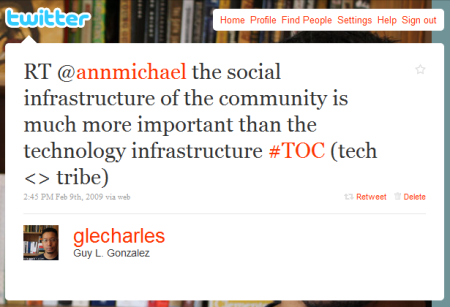I’ve been using this quote in internal and external presentations on audience development for so long, I’d forgotten its original source.
The 2009 Tools of Change Conference was the first I’d ever actively followed on Twitter via hashtag, and I was so captivated that it was almost like being there. [Never was sure if Ann was commenting, or quoting Gossieaux, Moran or someone else.] I wrote two posts about it — BUILDING COMMUNITIES AROUND CONTENT #TOC and THREE TIPS FOR CURATING THE COMMUNITY #TOC — that not only still hold up, IMO, but highlight a level of consistency in my own thinking that I’m happy to see.
I also met, virtually, a number of publishing people that week who would go on to become friends and trusted colleagues, primarily because I’d taken the initiative to engage, which eventually led to meeting many of them in person at BEA later that year, strengthening the “weak bonds” of social media connections into real-life relationships.
Technology is merely the tool tribes use to communicate with each other, and that communication took place long before the internet came along.
Last year, I wrote a post, SIX PEOPLE IN MY (VIRTUAL) NEIGHBORHOOD, about how Twitter had become my primary aggregator but blogs were still an invaluable platform for deeper engagement, spotlighting six writers who’d captured my attention. Even though I’ve only ever met two of them in person, they all still live in my virtual neighborhood, aka Google Reader, the RSS bodega where I hang out for more thoughtful insights.
While Twitter has become even more valuable since then as a professional discovery and networking tool, I still look to blogs for deeper engagement, and subscribe to feeds of blogs that offer real value.
Here’s seven more blogs I’ve recently started following, most of which I first came across via Twitter, and have found invaluable in my personal exploration of transmedia, and where it fits in my professional world:
storyCENTRAL Digital – I actually missed Alison Norrington’s panel at Digital Book World earlier this year, delaying my current obsession with transmedia by a few months, but since then, she’s become one of my most valued advisors in my exploration of its possibilities for publishers and authors. She’s very smart, an actual practitioner, and one of the most articulate advocates coming from a publishing perspective out there.
Deus Ex Machinatio – Andrea Phillips is another practitioner who generously shares her experience and insights with others, while also being a genuinely nice person (I’ve met her IRL twice.). Her Writing for Transmedia series is a must-read for writers, and her call for welcoming newcomers into the transmedia tribe was one of the most refreshing posts I’ve read all year.
Transmythology – I stumbled across Simon Pulman on Twitter back in September via one of the first posts I’d read that made transmedia’s connection to publishing crystal clear. I reprinted that one on Digital Book World, where I’ve been trying to introduce transmedia as a core topic of interest, and ever since have followed his blog for practical insights, smart analysis, and honest engagement.
This Monkey Can Type – Scott Walker doesn’t update his blog often, but his Transmedia 2.0 – Participatory Entertainment post remains one of the most influential things I’ve read this year, and as I’ve gotten to know him since via then telephone (remember that thing?!?!), he’s become another trusted colleague despite not yet meeting him in person. From Runes of Gallidon to his compelling vision of the future of co-created entertainment, he’s one of the smartest people I know who is working out on the bleeding edge.
EdTech Insight – Laura Fleming is my favorite kind of person, the kind who uses her blog to explore something she’s really passionate about, without any pretense or fauxthenticity. An Elementary School Library Media Specialist here in New Jersey, she sees transmedia as “a transformative piece in the future of education” and is not only advocating its use by others, but also finding ways to implement it herself.
Silverstring Media – Like Laura, Lucas J.W. Johnson is another one exploring his passion without pretense, adding immense value to the transmedia community by sharing his own insights and experiences. His series on What D&D Can Tell Us About Transmedia is a great read, and he and I were completely on the same page in Reimagining Realms of Fantasy.
Transmedia Storyteller – I’ve lost track of how I first came across Robert Pratten, but he brings a great combination of the provocative and practical to the transmedia space, perhaps best illustrated by the presentation he put together on Measuring Return on Investment in Transmedia. He also co-hosts the excellent Transmedia Talk podcast, and his Transmedia Storyteller platform that aims to offer “the LEGO building blocks of choice for cross-platform storytellers” is really intriguing and something to keep an eye on.
Those are just some of the interesting people in my transmedia neighborhood. Who are the people in yours?
Do you like email?
Sign up here to get my bi-weekly "newsletter" and/or receive every new blog post delivered right to your inbox. (Burner emails are fine. I get it!)




Thank you! That’s very kind of you and an honor to be included in your ‘hood!
You have inspired me to blog a little more often too 🙂
Rob
Thanks Guy! I am more than honored. Really. You all have been such an inspiration to me and have taught me so much already. The #TOC message above is such an important one in education right now since the US Government is pushing hard with its National Education
Technology Plan.
Thanks again!